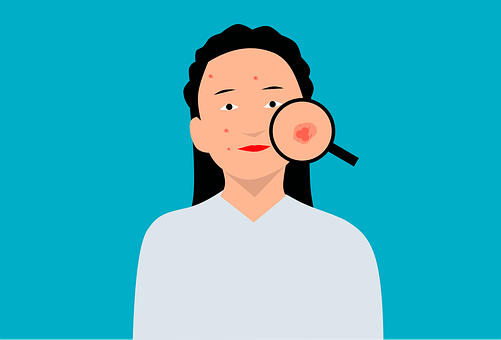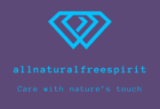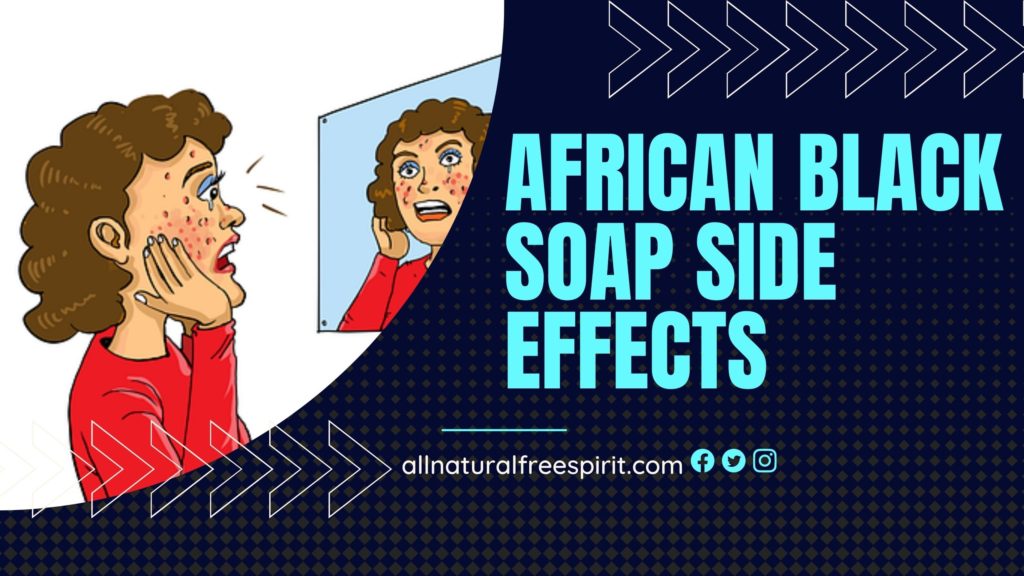Believed to be among one of the best natural soaps available, African black soap has been used for centuries to treat a variety of skin conditions.
Most users have only good vibes when asked about this magical soap. However, there have been a few reports African black soap side effects.
Really? How can anything this natural possibly have negative side effects?
Apparently, some people have experienced adverse reactions to African black soap. The most common complaint is that African black soap can dry the skin.
To some extent, this is to be expected, as the soap is designed to remove dirt and oil from the skin therefore leaving your skin dry.
Besides drying your skin, are there any other African black soap side effects? This article will explore the potential side effects of using African black soap and will help you decide if this natural product is right for you.
What Is African Black Soap?

African black soap is a natural product made from palm kernel oil, cocoa pod ashes, and water. The soap has been used for centuries to treat various skin conditions, including acne, eczema, and psoriasis.
The main ingredients in African black soap are palm kernel oil and cocoa pod ashes. Palm kernel oil is a natural moisturizer that helps to keep the skin hydrated.
The cocoa pod ashes are rich in antioxidants and help remove dirt and oil from the skin.
The process for making African black soap is a bit more unique – each culture has there own unique way of making it. However, there are some common ingredients in all these recipes.
These ingredients are what set African black soap apart from other bar cleansing soaps.
Read: How do you get rid of African black soap burn?
African Black Soap Side Effects?
As with any product, there is potential for African black soap to cause some side effects. Although these side effects are rare, it is important to be aware of them before using the soap. But it’s a natural product? How come it has side effects?
Just because a product is natural doesn’t mean it can’t cause side effects. Remember, even water can be deadly if you drink too much of it.
Why Does Africa Black Soap Have Side Effects?
Africa black soap is made from plants (palm kernel oil and cocoa pod ashes). Most of these plants are harvested from different parts of Africa. The acidity in each product may vary, which can cause skin irritation.
You might find one formula batch is ok, but the next leaves you with a rash. Basically, this has to do with the ingredients used and their acidity levels.
Read: African black soap hair growth

African Black Soap Side Effects
So, what are the potential African black soap side effects? The following are some of the potential side effects of using African black soap:
1: You Might Get Dry Skin
One of the most common complaints about African black soap is that it can dry the skin. Skin experts have eluded this to the soap’s ability to remove dirt and oil from the skin.
Some people who have used this black soap have reported that their skin became excessively dry and started to peel.
However, the majority have said that the dryness is only temporary and goes away once they get used to the soap.
If you happen to use the soap and experience dry skin, there are a few things that you can do to help mitigate the situation. First, make sure that you are drinking enough water.
African black soap can dehydrate you, so it is important to drink plenty of fluids. You might also want to consider using a moisturizer after you bathe.
2: You Might Get an Allergic Reaction
Some people have also reported experiencing an allergic reaction to African black soap. The symptoms of an allergic reaction can vary, but they typically include skin rashes, hives, and itching.
With different types of African black soap out there, it is possible to experience an allergic reaction to any of them.
Depending on your skintype, you might want to avoid using African black soap. If you have a history of skin allergies, it is best to consult with your dermatologist before using this product.
If you suspect that you are having an allergic reaction to black soap, stop using the soap and seek medical attention. An allergic reaction can be a sign of a more serious health condition.

3: Damage the Gastrointestinal Tract
Another potential side effect of using African black soap is damaging the Gastrointestinal Tract. This is because the soap contains high levels of alkali.
When the soap is ingested, it can cause an upset stomach, nausea, and vomiting.
Experts believe that the cocoa pod ashes in the soap are responsible for this side effect. People have reported experiencing constipation, diarrhea, and bloody stools after using African black soap.
Breastfeeding mums are advised not to use African black soap, as it can hurt the baby’s health.
If you experience any of the symptoms listed above after using African black soap, stop using the soap and seek medical attention. These symptoms could be signs of a more serious health condition.
Read: Small batch cosmetic manufacturing equipment
Frequently Asked Questions on African Black Soap
What Happens If I Use African Black Soap every day?
If you use African black soap everyday, you might experience dry skin, an allergic reaction, or gastrointestinal problems. African black soap is a strong cleanser and can strip the skin of its natural oils. It is important to drink plenty of water if you regularly use African black soap.
Can African Black Soap Be Used On Children?
African black soap can be used on children, but it is important to consult with a pediatrician before doing so. The soap contains high alkali levels, which can cause skin irritation and burns. It is also important to monitor children closely when using African black soap, as they might accidentally ingest the soap.
I Have A Skin Condition. Should I Use African Black Soap?
If you have a skin condition, it is best to consult with your dermatologist before using African black soap. African black soap can irritate and burn the skin, so it is not recommended for people with sensitive skin.
African black soap is a popular cleansing agent that has a variety of potential side effects. It is important to be aware of these side effects before using African black soap.
If you experience any African black soap side effects, stop using the soap and seek medical attention.

